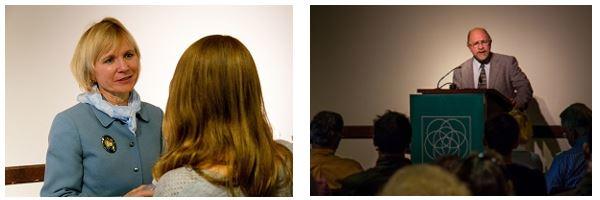
Thursday, April 21, 2016 - 11:30am to 1:00pm
Mississippi Room, Coffman Union
New therapies – particularly probiotic products and microbiota transplants – are challenging the regulatory approaches of the FDA and FTC. Probiotic food and dietary supplement products are proliferating in the marketplace, making a diverse array of health claims. At the same time, microbiota transplants – fecal, vaginal, skin, mouth and nasal cavity – are being used, or proposed, to treat serious medical conditions. Prof. Hoffmann discussed the issues presented by these therapies and their marketing and advertising, as well as possible ways to address them.
Co-sponsored by the University of Minnesota’s BioTechnology Institute and the Microbiota Therapeutics Program
Commentator:
Prof. Francisco Diez-Gonzalez, PhD
Head, Dept. of Food Science and Technology
University of Georgia
Attorneys
1.5 standard CLE credits are approved. Event ID: 217641.
American Medical Association/PRA
The University of Minnesota is accredited by the Accreditation Council for Continuing Medical Education (ACCME) to provide continuing medical education for physicians.
Physicians
The University of Minnesota designates this live educational activity for a maximum of 1.5 AMA PRA Category 1 Credits™. Physicians should claim only the credit commensurate with the extent of their participation in the activity.
Other Health Care Professionals: Research coordinators, nurse practitioners, nurses, and other health care professionals who participate in this CE activity may submit their Statements of Participation to their appropriate accrediting organizations or state boards for consideration of credit. The participant is responsible for determining whether this activity meets the requirements for acceptable continuing education.

Diane E. Hoffmann, JD, MS, is Professor of Law at the University of Maryland School of Law. Since 2000 she has served as the Director of the school’s Law & Health Care Program and from 1999–2012, she served as Associate Dean. She received her law degree from Harvard Law School and her Master's degree from Harvard School of Public Health. Prof. Hoffmann was a primary author of Maryland’s Health Care Decisions Act and has served as a member of a number of ethics committees, including those at University of Maryland Medical System and the Clinical Center at the National Institutes of Health.
Prof. Hoffmann is the Founder and Director of the Maryland Healthcare Ethics Committee Network. From June 1994-May 1995, Hoffmann was the Acting Staff Director of the Senate Subcommittee on Aging reporting to U.S. Senator Barbara Mikulski. From 2008–2014, she served as a member of the Board of Directors of the American Society of Law, Medicine & Ethics and as President of the Board in 2010 and 2011. Since 2013 she has served as a member of the Maryland Stem Cell Commission. Hoffmann has published numerous articles on health law and policy issues in legal journals as well as scientific and medical journals including Science, JAMA, the NEJM and Annals of Internal Medicine. Her recent scholarship has focused on the regulation of probiotics, health claim regulation, telemedicine, medical marijuana and the law, end-of-life care as a public health issue, the criminal prosecution of physicians for the prescribing of opioids, and the use of genetic tests in the courtroom. She has received two NIH ELSI grants related to the Human Microbiome Project: the first, on the regulation of probiotics, the second, on proposing a regulatory framework for microbiotia transplants.